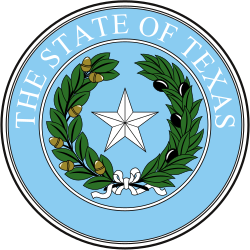Texas House of Representatives
All 150 seats in the Texas House of Representatives were up for election in 2010. The GOP captured 99 seats (a record), including 22 that were held by Democrats after the 2008 Texas House of Representatives election. This left the Democrats with 51 seats. Edmund Kuempel, the incumbent GOP candidate for District 44 seat, subsequently died; the seat was filled by special election on December 14 and won by his son, John, also a Republican. Also on December 14, two Democrats (Allan Ritter and Aaron Peña) announced they were switching parties and joining the Republicans, thus giving the GOP 101 seats, and a 2/3 majority in the House, giving them considerable leverage. [6] [7] Under Texas law, any bill which passes with 2/3 of both legislative chambers can become effective immediately upon the governor's signature (otherwise a bill does not become effective until September 1, the start of Texas' fiscal year). This also meant that the Democrats could not quorum bust, or deprive the House of the 2/3 of members required for operation. [8]
| Affiliation | Party (Shading indicates majority caucus) | Total | |
|---|
| | |
| Republican | Democratic | Vacant |
|---|
| Beginning of the 81st legislature | 76 | 74 | 150 | 0 |
|---|
| Before 2010 elections | 77 | 72 | 149 | 1 |
|---|
| Voting share | 51% | 48% | |
|---|
|
| After 2010 elections | 99 | 51 | 150 | 0 |
|---|
| Beginning of the 82nd legislature | 101 | 49 | 150 | 0 |
|---|
| Voting share | 67% | 33% | |
|---|






